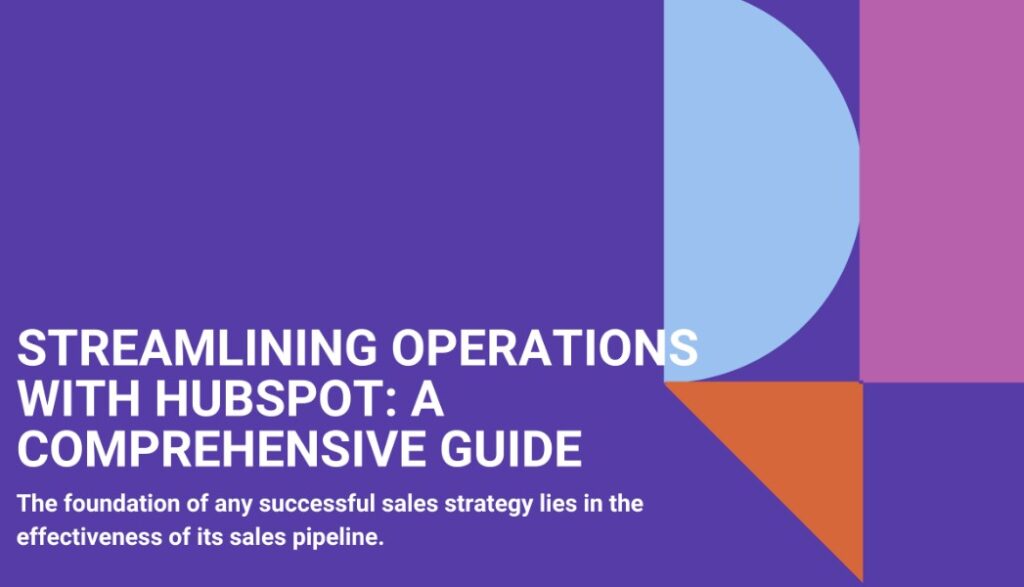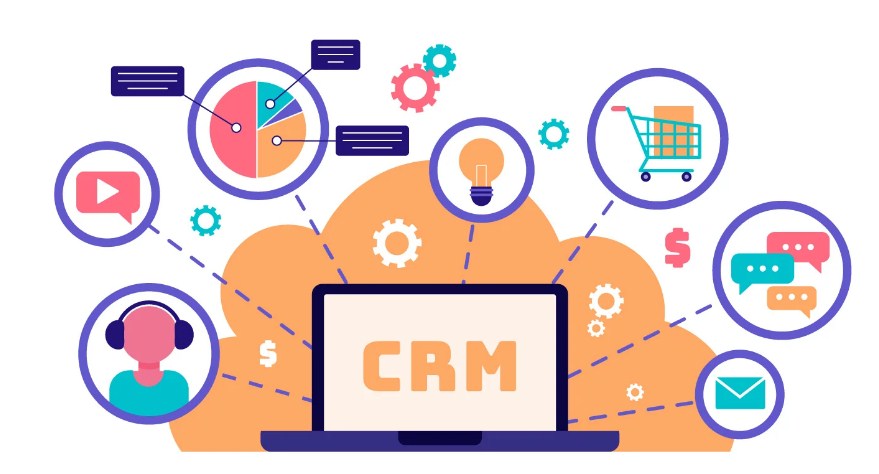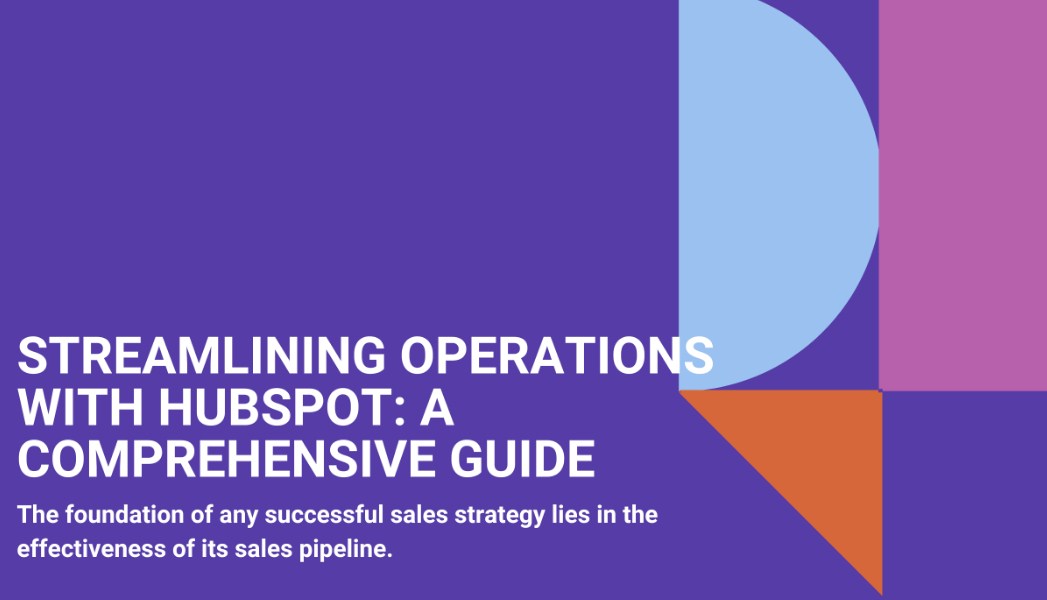HubSpot CRM The Ultimate Guide to Streamlining – Customer Relationship Management (CRM) software has become a pivotal tool for businesses aiming to streamline their sales, marketing, and customer service operations. HubSpot CRM stands out as one of the most widely used CRM platforms globally. But what makes it so effective, and why should your business consider adopting it? In this comprehensive guide, we’ll explore the ins and outs of HubSpot CRM, including its features, benefits, pricing, and where to purchase it. Let’s dive in!

What is HubSpot CRM?
HubSpot CRM is a cloud-based software solution designed to help businesses manage their interactions with customers and potential leads. Whether you’re a small business or an enterprise, HubSpot CRM offers tools for managing sales pipelines, tracking marketing efforts, automating repetitive tasks, and fostering stronger customer relationships.
It integrates seamlessly with your business’s existing processes, providing a 360-degree view of customer interactions, which helps your team to be more efficient and productive.
Key Features of HubSpot CRM
- Contact Management: Keep track of your leads and customers, categorize them, and manage follow-ups effortlessly. 📇
- Email Tracking & Notifications: Know exactly when a prospect opens your email and what they clicked on. 📧
- Sales Pipeline: Easily track the journey of each lead through your sales pipeline, from prospect to customer. 📊
- Automation: Automate repetitive tasks like sending emails, follow-ups, and assigning tasks. 🤖
- Reporting: Access comprehensive reports to measure your team’s performance, sales trends, and customer data. 📈
The Benefits of HubSpot CRM
HubSpot CRM offers a variety of benefits that can enhance your sales and marketing efforts. Here’s a closer look at how it helps businesses succeed:

1. Increased Productivity
By centralizing all customer interactions and automating key tasks, HubSpot CRM allows teams to focus on what matters most—building relationships and closing deals. This results in significant time savings for your sales and marketing teams. ⏱️
2. Better Customer Insights
HubSpot CRM aggregates customer data in one easy-to-navigate platform. This helps businesses make more informed decisions and personalize their outreach to customers. The more you know about your customers, the more likely you are to convert them into loyal advocates. 🤝
3. Scalability
Whether you’re a small startup or an established enterprise, HubSpot CRM scales with your business. As your needs grow, you can unlock additional features and integrations without disrupting your existing processes. 📈
4. User-Friendly Interface
HubSpot CRM is known for its simple, intuitive design. Even non-technical users can navigate through the system and start using it to its full potential right away. It’s the perfect solution for teams who want to hit the ground running. 🏃♂️
5. Seamless Integration with Other HubSpot Tools
HubSpot CRM integrates effortlessly with other tools in the HubSpot ecosystem like Marketing Hub, Service Hub, and CMS Hub, creating a unified platform for all of your business operations. 🌐
Real-World Examples of Businesses Using HubSpot CRM
HubSpot CRM isn’t just a tool for large corporations; it’s ideal for businesses of all sizes. Here are five real-world examples of how businesses are benefiting from HubSpot CRM:
1. HubSpot CRM for Lead Generation
HubSpot CRM is a powerful tool for lead generation. Take the example of a digital marketing agency. They used HubSpot CRM to track interactions with potential clients, segment leads based on interest level, and automate follow-ups. As a result, they were able to increase their lead conversion rate by 30% within just three months.
2. HubSpot CRM for eCommerce
An eCommerce business selling handmade furniture used HubSpot CRM to track customer activity on their website, automate personalized emails for abandoned carts, and follow up on leads who were browsing but hadn’t purchased. This led to a 40% increase in repeat customers and a 25% increase in monthly revenue.
3. HubSpot CRM for B2B Sales
A B2B software company used HubSpot CRM to streamline its sales process. By using the platform’s email tracking, lead scoring, and pipeline management tools, they were able to reduce the sales cycle by 20% and close more deals faster.
4. HubSpot CRM for Customer Support
A SaaS company integrated HubSpot CRM with their customer service operations, allowing their support team to quickly access customer information, track ongoing issues, and provide timely solutions. This improved their customer satisfaction rate by 50%.
5. HubSpot CRM for Real Estate
A real estate agency used HubSpot CRM to track interactions with clients and schedule follow-ups for property viewings. The system helped them close 35% more deals by ensuring that no lead slipped through the cracks.
Comparing HubSpot CRM with Other CRM Tools
To better understand why HubSpot CRM is a top choice, let’s compare it with other popular CRM solutions.
| Feature | HubSpot CRM | Salesforce | Zoho CRM | Pipedrive |
|---|---|---|---|---|
| User-Friendly Interface | ✅ | ❌ (steeper learning curve) | ✅ | ✅ |
| Email Marketing Integration | ✅ | ✅ | ✅ | ❌ |
| Automation Features | ✅ | ✅ | ✅ | ✅ |
| Reporting & Analytics | ✅ | ✅ | ✅ | ✅ |
| Price | Free / Paid Plans | Custom Pricing | Starts at $12/user/month | Starts at $12.50/user/month |
| Best For | Small to medium businesses | Large enterprises | Small to medium businesses | Small businesses |
| Free Plan | ✅ | ❌ | ✅ | ❌ |
Where to Buy HubSpot CRM & How Much It Costs
HubSpot CRM offers a free plan with basic features to get started. For businesses that need advanced features, HubSpot offers premium plans starting at $50/month for the Starter plan. If you need the complete suite of HubSpot tools (Marketing Hub, Sales Hub, Service Hub, and CMS Hub), you can choose from the Professional or Enterprise plans, which can cost $400+/month.
To get started, simply visit HubSpot CRM and choose the plan that best fits your needs. You can sign up for a free trial or get in touch with a sales representative for custom pricing.
Use Cases: What Problems Does HubSpot CRM Solve?
1. Improved Lead Management
Businesses often struggle with organizing and managing leads. HubSpot CRM solves this by centralizing all lead data and providing tools to track their journey through the sales pipeline.
2. Increased Sales Efficiency
Sales teams can be more efficient by automating manual tasks and gaining insights into prospects’ behaviors. HubSpot CRM allows you to prioritize leads based on their interactions, ensuring that your sales team focuses on the most promising opportunities.
3. Better Marketing Alignment
Marketing teams often face challenges in aligning their efforts with sales teams. HubSpot CRM bridges this gap by providing shared tools and data, ensuring that everyone is on the same page when it comes to lead generation and customer outreach.
FAQs About HubSpot CRM
1. What is the price of HubSpot CRM?
HubSpot CRM offers a free plan with basic features. Paid plans start at $50/month for the Starter plan, with additional features available in higher-tier plans.
2. Is HubSpot CRM suitable for small businesses?
Yes! HubSpot CRM is designed to scale with businesses of all sizes, making it perfect for small businesses looking to grow their sales and marketing efforts.
3. How easy is it to use HubSpot CRM?
HubSpot CRM is known for its user-friendly interface, making it easy to get started, even for those with no technical background.
4. Can I integrate HubSpot CRM with other tools?
Yes, HubSpot CRM integrates with a wide variety of third-party tools, including email marketing platforms, social media, and customer service tools.
5. Where can I buy HubSpot CRM?
You can purchase HubSpot CRM directly from the official website at HubSpot CRM.
By using HubSpot CRM, businesses can streamline their sales and marketing processes, improve lead management, and ultimately drive growth. Ready to take your business to the next level? Get started with HubSpot CRM today!
Read More >>>
- Best CRM for Startups: Top 5 CRM Solutions to Streamline Your Startup’s Growth in 2025
- Best Salesforce Alternatives: Compare Features, Benefits, & Prices for 2025
